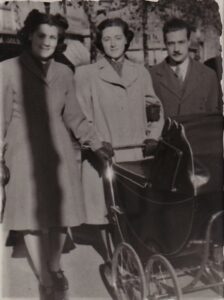When the war was over, my father, no longer having to hide from the “Reds,” was able to play the violin again. By 1941 he had resumed life as a professional musician, performing as well as teaching. My mother had arrived in Barcelona from her parents’ farm to study Classics at the university, and she suddenly decided that she wanted to learn to play the violin. She had never seen a female violinist (there were almost no women in European orchestras at the time), but she didn’t let that discourage her. She asked around and somebody gave her my father’s name. She went to the Conservatory expecting to be met by an elderly gentleman. Instead, she rode up in the elevator with someone she thought might be a fellow student, and was surprised when they both entered the same classroom and he introduced himself as her teacher.
Even in the case of considerable talent, the early years of violin playing are hard on the ear. My mother was not especially musical, but that did not prevent my father from falling speedily and deeply in love. After the lesson, he would walk her to her apartment, then go home, and after his parents and sisters had gone to bed, he would pour out his passion in a letter that he would hand her the next time they met. “When I saw him coming towards me,” my mother said, “I always checked to see whether there was a bit of paper peeking out of the breast pocket of his jacket. That’s how I knew that he had another letter for me.”
They saw each other several times a week, the violin lessons having given way to more enticing pursuits. What did they do during these outings? They had no car, and very little money (until he married at 29 my father handed his earnings to his parents), so movies and restaurants were out of the question. Instead, in all weathers they walked for hours on the gloomy streets of postwar Barcelona. The rest of the time, she studied for her degree while he took every gig that came his way and wrote her love letters late into the night.
I have those letters, dozens and dozens of them. They are overwhelming in their intensity, as if the floodgates had suddenly opened and all the repressed energy of those years of terror and confinement was now being turned into a hymn to love, music, and hope. Healthy and vigorous again, and still in his twenties, my father turned his back on the past and threw himself headlong into the happiness provided by his love for my mother and the ability, at last, to lead the life of a musician.
The letters contain almost no hint of either the horrors of the past or the hardships of the present. Here is one: “I’ve been listening to jazz on the radio,” my father writes, “full of happiness, tapping my feet the way I used to do when I was nineteen and thought that disasters could never happen….” And here is another: “Please convey to your mother my family’s gratitude for the splendid basket of food that she sent us.” It may seem odd these days for the mother of the bride to send her future in-laws a basket of farm-grown provender—sausages made from the annual pig, eggs individually wrapped in newspaper, figs, almonds, raisins, and olive oil. But in the dire food scene of Barcelona that basket must have seemed like a cornucopia of delights.
They were married in September, 1943, in my mother’s village. My father and his family traveled from Barcelona in a hired bus, and after the festivities they tied a double-bed mattress (a gift from the bride’s parents) to the roof of the bus and returned to the city, where they delivered the mattress and the newlyweds to their new apartment. Thirteen months later, I was born.
(To be continued.)



4 Responses
Are you going to make these memories into a book? You should as they are beautiful and funny and honest ❤️
Thank you, Phyllis. If only I had the time and energy!
I do love the terrific photos you post on FB.
I think the letters my grandfather Papa Memo wrote to my grandmother Mamina (to us kids) are still around, but I have a vague memory that my mother destroyed them at some point because, she said, they were so personal.
I’ll have to check – then figure out how to make them legible to a modern eye!
Such an era – in Mexico there were refugees, and we had our own Revolución and political succession problems (even now, Mexico does not have a vice-president, because some idiot set it up originally that the LOSING party got the vice-presidential slot – which often lead to a regrettable death of the president from the other party!).
I have pictures, and maybe an old sepia movie from the turn of the century (the TWENTIETH century) – of the days of Don Porfirio Diaz, dictator.
You have to live when you’re alive – no going back, no waiting around for better times – so there are a lot of stories. And in Mexico, MANY Spanish refugees.
I was never that interested in the details, and my Papa Memo died when I was about 13, or some kind of liver problem they could do nothing for after they opened him up (as they did in those days without telling the patient or his family anything) and closed him back up (my aunt told me some time last year). I still miss him – he was a wonderful pianist.
Thanks for bringing memories up.
I hope you find those letters, Alicia!